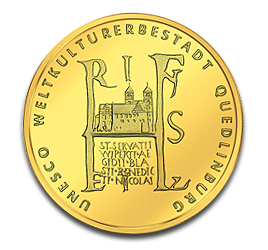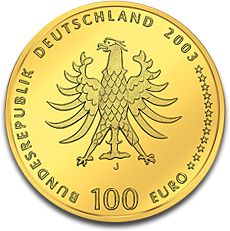100 Euro Quedlinburg 1/2oz Gold Coin 2003 | Germany
The German 100 Euro commemorative coin from the year 2003 is dedicated to the UNESCO World Heritage Quedlinburg. The coin shows the St. Servatius Church in Quedlinburg and the coat of arms of Emperor Heinrich I. Quedlinburg is an famous city is Germany that is said to have roots dating back to the early 9th century. This is a brilliantly designed coin that celebrates German history. Every year Germany issues a 100 Euro gold coin with a different design. These coins are popular with both investors and collectors. The 100 Euro Quedlinburg Goldmünze 2003 has a fine gold content of 999.9/1000 and a fine weight of 1/2oz, which corresponds to 15.55g fine gold. 80,000 pieces were minted at an issue price of 190 Euros. Like all 100 Euro gold coins of the series, the Quedlinburg has an edge bar and a rippled edge. The theme of the coin is the city of Quedlinburg, which was included in the UNESCO list in 1994. The marginal inscription on the front is "Unesco Weltkulturerbestadt Quedlinburg". The motif in the center of the coin depicts the St. Servatius church, which was inserted into the Emperor Heinrich I. coat of arms. The portrait was created by the German sculptress and medalist Agatha Kill. The following famous Quedlinburg sacred buildings are mentioned below the main motif in characters: St. Servatius church St. Wiperti St. Aegidii (oldest town church) St. Blasii St. Benedict St. Nikolai The reverse of the gold coin shows as a motif a representation of the German Federal Eagle. The mint mark is imprinted directly below the Eagle. The inscription around the edge of the coin reads "Federal Republic of Germany 2003" and "100 Euro". On the right outer edge 12 stars are embossed which represents the European Union. Mint Mint Mark Name Berlin A State Mint Berlin Munich D Bavarian Mint Stuttgart F State Mint Baden Stuttgart Karlsruhe G State Mint Karlsruhe Hamburg J Mint Hamburg The Gold Euro coin series comes in three different variations issued by the German Ministry of Finance. The first is the 200 Euro Gold Coin which was launched in 2002, with the fine weight of 1oz and the theme "Monetary Union - Introduction of the Euro". The second variant is the 100 Euro Gold Coin with a fine weight of 1/2oz. This includes the 100 Euro Quedlinburg 2002. The third variant has a nominal value of 20 Euros and a fine weight of 1/8oz. The coin series was introduced in 2010 and went for six years concluding in 2015. Each year highlights a different design with a theme of the "German Forest". In 2016 a new series with the topic "Native Birds" was issued. It is also designed with six different motifs for six years. Quedlinburg 2003 The old town of Quedlinburg was registered in the list of UNESCO World Heritage sites in 1994. Quedlinburg was the first UNESCO theme of the new German 100 Euro commemorative coins in 2003. The series began in 2002 with the publication of the coin "Monetary Unions - Introduction of the Euro". Name: UNESCO World Heritage Quedlinburg Country: Germany Year: 2003 Publisher: Federal Ministry of Finance Fine content: 999.9/1000 Fine weight: 1/2oz Denomination: 100 Euro100 Euro Quedlinburg 2003
Fine Weight, Fineness and Mintage
Appearance
Mints
History
Details
| Metal | Gold |
| Form | Gold Coin |
| Country of Origin | Germany |
| Manufacturer | Verkaufsstelle für Sammlermünzen der BRD |
| Series | 100 Euro |
| Purity | 999.9/1000 |
| Fineweight | 15.55 gram |
| Gross Weight | 15.55 gram |
| Grade | Brilliant |
| Condition | Circulated |
| Face value | 100 Euro |
| Thickness | 1.65 mm |
| Diameter | 28.00 mm |
| Mintage | 200000 |
| Packaging | Capsule with Certificate and Etui |






